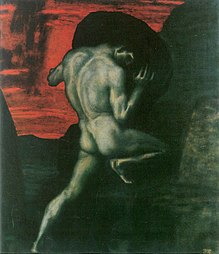Sisyphus
Jump to navigation
Jump to search

In Greek mythology, Sisyphus (Greek: Σίσυφος) was punished for his self-aggrandizing craftiness and deceitfulness by being forced to roll an immense boulder up a hill, only to watch it roll back down, repeating this action for eternity.
| This theme article is a stub. You can help Wikiquote by expanding it. |
Quotes[edit]
- The history of philosophy records a series of defeats, resulting in final and complete disaster. Twenty centuries of herculean labors, performed by the greatest intellects the race produced during that period, and philosophy ends where philosophy began — the will-o'-the-wisp it pursues is as far beyond the reach of Kant as it was of Plato. Round and round it moves in a fatal circle from which there is no exit. It builds its imposing temples on foundations of sand, and no sooner is the capstone planted in triumph than the entire superstructive falls into ruin. Philosophy, never daunted, rolls her Sisyphus stone to the very summit of the mountain and then, when victory seems assured, back it tumbles to the starting point.
- Arthur M. Lewis, Ten blind leaders of the blind 1910 p. 47
- We spend our lives fighting to get people very slightly more stupid than ourselves to accept truths that the great men have always known. They have known for thousands of years that to lock a sick person into solitary confinement makes him worse. They have known for thousands of years that a poor man who is frightened of his landlord and of the police is a slave. They have known it. We know it. But do the great enlightened mass of the British people know it? No. It is our task, Ella, yours and mine, to tell them. Because the great men are too great to be bothered. They are already discovering how to colonise Venus and to irrigate the moon. That is what is important for our time. You and I are the boulder-pushers. All our lives, you and I, we’ll put all our energies, all our talents into pushing a great boulder up a mountain. The boulder is the truth that the great men know by instinct, and the mountain is the stupidity of mankind.
- Doris Lessing, The Golden Notebook (1962), p. 182
- Sisyphus is not, finally, a useful image. You don't roll some unitary boulder of language or justice uphill; you try with others to assist in cutting and laying many stones, designing a foundation.
- Adrienne Rich Arts of the Possible (2001)
The Myth of Sisyphus (1942)[edit]

- The gods had condemned Sisyphus to ceaselessly rolling a rock to the top of a mountain, whence the stone would fall back of its own weight. They had thought with some reason that there is no more dreadful punishment than futile and hopeless labor.
- Opinions differ as to the reasons why he became the futile laborer of the underworld. To begin with, he is accused of a certain levity in regard to the gods. He stole their secrets.
- Homer tells us also that Sisyphus had put Death in chains. Pluto could not endure the sight of his deserted, silent empire. He dispatched the god of war, who liberated Death from the hands of her conqueror.
- You have already grasped that Sisyphus is the absurd hero. He is, as much through his passions as through his torture. His scorn of the gods, his hatred of death, and his passion for life won him that unspeakable penalty in which the whole being is exerted toward accomplishing nothing. This is the price that must be paid for the passions of this earth. Nothing is told us about Sisyphus in the underworld. Myths are made for the imagination to breathe life into them.
- I leave Sisyphus at the foot of the mountain! One always finds one's burden again. But Sisyphus teaches the higher fidelity that negates the gods and raises rocks. He too concludes that all is well. This universe henceforth without a master seems to him neither sterile nor futile. Each atom of that stone, each mineral flake of that night filled mountain, in itself forms a world. The struggle itself toward the heights is enough to fill a man's heart. One must imagine Sisyphus happy.
- Original French: La lutte elle-même vers les sommets suffit à remplir un cœur d'homme; il faut imaginer Sisyphe heureux.
- Variant translation: The fight itself towards the summits suffices to fill a heart of man; it is necessary to imagine Sisyphus happy.

